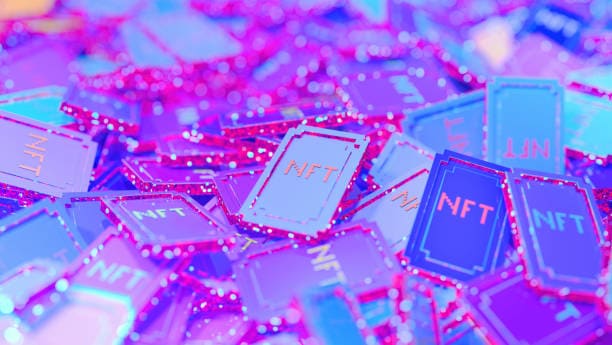Table of Contents
The term “NFT gaming” stands for Non-Fungible Token games. NFTs are unique tokens that can be owned and sold on the blockchain. These digital assets can be transferred between users; however, each token has its own unique value associated with it so players cannot swap or trade them freely. This means that by purchasing a particular NFT token from one person, you automatically own all future rights on that specific NFT token forever!
What Are NFT Games?
NFT stands for Non-Fungible Token.
NFTs are unique digital assets that can be owned, bought and sold. NFTs are distinct from conventional cryptocurrencies as they are backed by tangible assets such as a unique card or an artwork, thus possessing real-world value. Moreover, NFTs can serve diverse purposes – from being traded on exchanges akin to stocks to being leveraged by developers for building novel games (further elaborated in subsequent sections).
How NFT games work?
NFTs are non-fungible in the sense that they are unique, and cannot be replaced by another identical token. This means that each NFT has its own set of characteristics, making it stand out from other tokens in its category.
For example: If you have one rare baseball card versus another rare baseball card, they might both have value but they’re not exactly equal because there’s no way to trade them for each other–they’re unique physical items with different attributes like age and condition as well as market demand for these attributes among collectors who want them for their collections or resale value at auction houses like Sotheby’s or Christie’s.”
Examples of popular NFT games and their gameplay mechanics
CryptoKitties
Fungames
Decentraland
Etheremon
The popularity of NFTs and their gameplay mechanics is evident in the multitude of games built on the Ethereum blockchain. The most popular ones include:
CryptoKitties, which allows users to buy, sell and breed digital cats using smart contracts;
Fungames (https://fungames.io), a platform for creating gaming DApps based on Ethereum;
Decentraland (https://decentraland.org), an open source virtual reality platform where users can create content and applications using VR technology;
Etheremon (http://www.etheremon.com/), which allows users to catch, train and battle creatures called Mons in order to claim ownership over them by purchasing them through smart contracts
Difference between NFT games and traditional video games
NFT games are virtual goods that can be owned and traded. NFTs extend beyond the realm of video games to encompass any other form of digital content, such as music or art. The blockchain technology behind NFTs offers new opportunities for developers to create innovative experiences for their users.
In the conventional gaming industry, players typically shell out money to procure a license for accessing the game (for instance, $50 for a game license). In contrast, in NFT games players don’t need any payment because everything happens on blockchain network where it’s impossible to hack into someone else’s account without permission from both sides involved in transaction process – buyer & seller/creator/developer etc..
Insights: Advantages and Challenges
NFT games are a form of digital collectibles that can be traded on the blockchain. They can also be purchased and sold through secondary markets, like auctions or exchanges.
This article will examine the benefits and hurdles of NFTs concerning game developers and players alike.
Advantages of NFT games
As a digital asset, NFT games are decentralized and can be owned by anyone. This implies that you can play these games without the involvement of a central authority or a company; all you need is the game and an internet connection.
Additionally, NFTs have no age restrictions: they can be played by children as well as adults without any issues or consequences (provided it’s not inappropriate content). Furthermore, since they’re not subject to censorship from any government entity or corporation–and because they don’t require much bandwidth for playing–you won’t have trouble accessing them from anywhere in the world!
Challenges of NFT games
NFT games are still in their infancy and face many challenges.
The legal status of NFTs is uncertain, with some countries banning them outright and others allowing them only for certain types of assets (like real estate).
Privacy concerns about smart contracts have led some developers to use centralized servers instead–but this defeats the purpose of using blockchain technology in the first place!
Getting gameplay mechanics right can be challenging when players do not have ownership of their game assets. The loss of access to game assets after years of investment in an online game may lead players to feel unfairly deprived of the time and effort they had dedicated to playing the game.
Insights from experts in the NFT gaming industry
In the words of the experts, here are some insights about NFT games:
They’re a new and emerging trend in the gaming industry.
They’re a new way of monetizing games.
They can build communities around a game by giving players more ownership over their in-game assets.
Forecasts: The Future of NFT Games
Although NFT games have existed for some time, they are still at a nascent stage. As is the case with any novel technology or product, there are numerous uncertainties pertaining to their future course of evolution and success. However, we can make educated guesses about what the future holds for NFT games based on trends from other industries and companies that are already using them.
NFTs have been used successfully in other industries such as art and music–and even clothing! A company called CryptoKitties sold one of its digital cats for over $100K; this demonstrates how valuable these digital assets can become when backed by real-world value (i.e., cryptocurrency). So far, we’ve seen several examples of companies experimenting with this idea: musicians releasing songs encoded onto Ethereum’s blockchain; artists selling limited edition paintings through smart contracts; even brands creating limited edition sneakers which customers can buy directly from an artist rather than via traditional retailers like Foot Locker or Nike itself!
The future of NFT games and their potential impact on the gaming industry
NFT games are a nascent concept, and the industry is yet to mature. Nevertheless, there are signs that NFT games will witness an upswing in popularity in the future. One such indicator is that the proliferation of the digital era has facilitated the accessibility of games on mobile phones and computers, thereby enabling more individuals to relish playing such games than ever before.
The rise of eSports has also helped increase interest in video games overall. This growing popularity makes it likely that more companies will start creating NFT titles because they know there’s already an audience waiting for them!
Potential trends
The potential trends in NFT gaming and their impact on the gaming industry are discussed below:
Decentralized storage of game assets. This is a process where users can store their virtual items on a blockchain instead of centralized servers. The advantage is that this makes it harder for hackers to get access to these items and steal them.
Smart contracts as an alternative to traditional licensing agreements between developers and publishers (or other third parties). A smart contract is an automated program that executes financial transactions when specific conditions are met by all parties involved in it, thus reducing costs associated with manual verification processes such as audits by lawyers or accountants before signing contracts
Regulatory and legal implications of NFT games
NFTs are not regulated by the SEC or any other federal agency in the United States, and this is worth noting. Instead, NFTs are considered securities and subject to their regulations. It’s important to recognize, however, that NFTs are not subject to these regulations since they do not fall under the category of “traditional” securities.
NFTs can be sold in private transactions; however, they’re subject to local laws and regulations as well as those of their respective jurisdictions.
Conclusion
NFT games are an exciting new form of gaming that offers players a unique experience. They can be played anywhere and anytime, with no need for a console or computer. Players collect digital assets which they use to build their own worlds in these games. This means that they have more control over what happens than traditional video games do!

Ethan Moore, crypto and stock trader since 2012. Co-founder of Blockwatch experts team.
